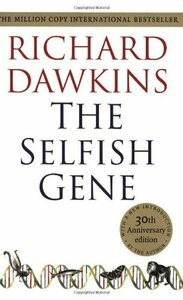Take a photo of a barcode or cover
informative
reflective
medium-paced
My first foray into Dawkins writings came at the expense of crisis in the belief of my own self worth. Not because the content of the book brought about such a revelatory sensation within me but because Dawkins couldn't decide whether I was the second smartest person in the world after him or if I was a true bottom-of-the-barrel idiot. The approach seemed to shift from paragraph to paragraph and having heard so much praise for his prose I found it quite jarring. Admittedly this is his first book and perhaps this has improved in later works. The content itself (it's validity and whether it holds up I'm yet to investigate) was fascinating and I'd highly recommend the read, maybe not as a start in genetics but definitely as an early stepping stone.
Dawkins has an excellent command of the language, and I really enjoyed this evolutionary biology classic. Replicators, genes, gender competition, cooperation, discussion on group and kin selection, game theory; Dawkins runs the gamut. The most interesting piece in my mind is the term he popularized from this book, on memes. He introduces the concept that ideas can be replicators much in the same way genes are, and though they spread through different means they can share many of the same properties. I should probably reread this section again at another date.
View my best reviews and a collection of mental models at jasperburns.blog.
View my best reviews and a collection of mental models at jasperburns.blog.
I am probably judging this too harshly on the endnotes/additional chapters droning on. The original book itself is probably a 4.25.
Conversationally written, this book subtley encouraged my understanding of the process of evolution.
A bit too much in-fighting with other scientists, and a bit too long winded in portions, but otherwise a fantastic and fascinating read.
A bit too much in-fighting with other scientists, and a bit too long winded in portions, but otherwise a fantastic and fascinating read.
informative
medium-paced
Chapters 2 and 11 had a profound impact on how I see our world. The other chapters, although also relevant, are very boring to read because their ideas seem to be ever present; and it just feels like you’ve already known that stuff all your life.
If you’re not in sweet delicious grandpa-age yet and grew up in the west (whatever that means) the ideas in this book, by way of Charles Darwin, definitely acted as your society’s bible. Even if they were never explicitly mentioned as such. It’s the backbone of who we think we are and where we came from.
If you’re not in sweet delicious grandpa-age yet and grew up in the west (whatever that means) the ideas in this book, by way of Charles Darwin, definitely acted as your society’s bible. Even if they were never explicitly mentioned as such. It’s the backbone of who we think we are and where we came from.
A fantastic read! I wonder, if I'd read this as a teenager, if I'd have coincided an alternate career path. An easy read with complex ideas, I feel I've got a much better understanding of evolution than I did before. I particularly liked the explanation of Evolutionary Stable Strategies, it really solidified some of the broader concepts.
This book is concerned with what enables the survival of genes, linking it with their ability and likelihood to replicate and therefore remain as a "living" part of our world. Dawkins goes on to discuss the role of genes in (animal) behaviour, the importance of adaptation, the importance of genetics and gene inheritance, among other things. Dawkins explains all of this in a very clear manner that to me didn't feel condescending in the slightest, and there are plenty of examples utilised to illustrate his arguments.
It is worth noting that in the version I read, at least, there was an effort to update the book with more recent scientific information or much-needed reviews. While listening to this on audio, it became, however, a bit confusing to me at times, as there were two narrators, one for endnotes and quotes, another one for the actual text... or at least I think that was it, because they were so mixed that by the end I couldn't tell who was the main narrator and who was the secondary one. That can give you an idea of how convoluted this book seems at times.
Also, there were moments when I felt his theories weren't developed well enough... or at least were quite reductionist. Because he is focusing on the genes, Dawkins gives the impression that this is the sole arbiter of behaviour. And while he does make reference to the notion of 'memes' and the cultural aspect in influencing behaviour, he does so very briefly (especially the latter. He does try to expound a bit more on the role of memes in the last few chapters, but still on a very gene-centred view). For example, when he develops his argument on parentage and gene lineage, he writes that one is more genetically related to one's siblings than to one's children, and therefore this would mean that one would be more protective of one's siblings... Of course he states counters to that, as everyone expects. But the detail with which he expounds this (e.g. an animal has 1/8 of chance of saving one of his cousins from drowning because there is a chance of 1 in 8 that he and his cousin have genes in common), is quite dull and at least left me with the impression that his theory in practice doesn't fit very well.
Some of the detours he takes in the narrative were also a bit jarring... I understand this is a book on evolution and quite highly regarded as an atheist text, but to have Dawkins so blatantly disregard faith and other aspects of religion (that I'll just say I don't condone nor partake of) felt very out of place in the text.
Overall, a worthy read if you're interested in the subject, but in need of some more polish and updates.
It is worth noting that in the version I read, at least, there was an effort to update the book with more recent scientific information or much-needed reviews. While listening to this on audio, it became, however, a bit confusing to me at times, as there were two narrators, one for endnotes and quotes, another one for the actual text... or at least I think that was it, because they were so mixed that by the end I couldn't tell who was the main narrator and who was the secondary one. That can give you an idea of how convoluted this book seems at times.
Also, there were moments when I felt his theories weren't developed well enough... or at least were quite reductionist. Because he is focusing on the genes, Dawkins gives the impression that this is the sole arbiter of behaviour. And while he does make reference to the notion of 'memes' and the cultural aspect in influencing behaviour, he does so very briefly (especially the latter. He does try to expound a bit more on the role of memes in the last few chapters, but still on a very gene-centred view). For example, when he develops his argument on parentage and gene lineage, he writes that one is more genetically related to one's siblings than to one's children, and therefore this would mean that one would be more protective of one's siblings... Of course he states counters to that, as everyone expects. But the detail with which he expounds this (e.g. an animal has 1/8 of chance of saving one of his cousins from drowning because there is a chance of 1 in 8 that he and his cousin have genes in common), is quite dull and at least left me with the impression that his theory in practice doesn't fit very well.
Some of the detours he takes in the narrative were also a bit jarring... I understand this is a book on evolution and quite highly regarded as an atheist text, but to have Dawkins so blatantly disregard faith and other aspects of religion (that I'll just say I don't condone nor partake of) felt very out of place in the text.
Overall, a worthy read if you're interested in the subject, but in need of some more polish and updates.

